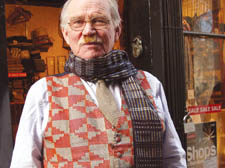|
|
 |
| |

?Calum Robertson sports one of his handwoven waistcoats outside his store |
Waist not want not – an African odyssey down Camden Passage
Waistcoats have been the choice of dapper gentlemen over the decades, and there are none finer than those made by Calum Robertson, writes Peter Gruner
THE African Waistcoat shop in Camden Passage is virtually an institution.
You feel it’s been fitting out gentlemen who want to dress slightly ostentatiously for that special occasion for hundreds of years.
But in fact the tiny saloon room shop at the Islington Green end of the antiques market opened just five years ago.
Now, in a break with tradition, the shop is to launch a new “gorgeous” handmade women’s waistcoat to sell alongside the men’s.
With dozens of different coloured handwoven waistcoats on display, there is nothing quite like this shop anywhere. It is the perfect example of the kind of specialist outlet that is currently under threat in the world famous market.
To break even, owner Calum Robertson needs to sell three or four waistcoats a week, but to do well he needs to sell five. So, to improve sales and also due to popular demand, he will soon be launching his women’s range.
Mr Robertson, 71, has the bearing of a military man and talks about his garments with quiet pride.
“The materials are all handwoven and come from south-west Nigeria,” he said. “I have a lady in Sussex who makes the waistcoats for me, but I sew on the buttons. She used to work in Savile Row. ”
Because each waistcoat is individually handmade and intricately woven, the garments are not cheap – as Mr Robertson is the first to admit.
They can cost anything between £150 and £220, the same price range you would expect in a top clothing store in the West End.
Famous customers include Tottenham MP David Lammy, writer and columnist Nick Cohen, and Tim Wonnacott from BBC TV’s Bargain Hunt.
Married with three children and a grandfather, Eton-educated Mr Robertson said that prior to opening the shop he’d been a Jack of all trades and master of none. He added: “I might be a bit scruffy myself but I’ve always been interested in men’s clothes.”
With the eviction of up to 40 antique traders at The Mall, emporium life in Camden Passage has never been more uncertain.
Mr Robertson is highly critical of Islington council, who he blames for making insufficient effort to protect the market.
“They could strengthen protection of the Passage, but in the short term they seem pleased with the big retailers coming in.
“Camden Passage is unique, with its antiques and small specialist shops, and people come from all over the world visit us. We are going to lose all that soon if we don’t buck our ideas up.”
Mr Robertson normally makes one five-week trip to Nigeria each year to visit the cloth markets and his regular weavers.
“It can take a long time to get anything done in that country,” he said. “I’m aware of the tendency for exploitation, particularly in Nigeria, so I pay a little more than they would earn locally.”
He admits that waistcoats are not the height of fashion but believes that, particularly in a recession, bright clothes will be making a comeback. “They allow men to show off without being garish,” he said.
The current interest in period TV drama could also inspire a renaissance in the garment.
“People also wore fancy waistcoats in the 1940s and 1950s and again in the 1970s,” he added.
|

|
 |
|
 |
|

